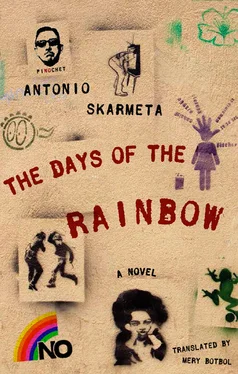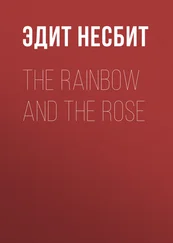On the stage of the Teatro Municipal, a chorus of about one hundred elegantly dressed men and women — the men in smoking jackets, the women in long silk dresses — await the conductor’s entrance, while in the orchestra, string and brass instruments are tuned following the first violinist. This lively hubbub is accompanied by the cheerful talk of the audience sitting in the red velvet armchairs and the tinkling of bracelets of the ladies, who’re looking at the box seats, where some of the prominent figures of Chilean society pose nonchalantly.
In his dream, Bettini sees himself behind the scene and concludes that his job there is to signal when the chorus and the conductor have to take their place at the stage. He perceives the nervousness in the audience’s coughs and the cracks of the fans the ladies use to prevent sweat from smudging their makeup.
Little by little, the tuning of instruments comes to an end, replaced by an expectant silence. The first violinist has taken his place and looks toward the stage wings, nodding. An official from the Municipal, holding a clipboard with technical instructions, approaches Bettini and, touching his elbow, tells him, “Your turn, Maestro.”
In a flash of fatal illumination, Bettini realizes that he’s wearing an impeccable frock coat with an immaculate starched white dickey, and that he’s holding a baton in his hand. He remembers now that he hadn’t felt his throat so dry since his conversation with the minister of the interior. His feet feel heavy, as if they were made of iron, and he’s unable to move until the man, kind but also compulsively professional, smiles gently at him.
But the man next to him steps over the line: he gently pushes Bettini to the proscenium, and when the musicians see him coming, they all stand up and the audience gives him an ovation.
Completely certain that the baton he’s holding in his right hand is a dagger that he won’t know how to use, Bettini delays his imminent cataclysm with theatrical bows to the audience. The ovation comes to an end only to start again immediately, a total and massive applause from those thousands of spectators who simultaneously have turned their faces toward the left side of the stage. Bettini’s gaze follows theirs, and he thinks he’s having a bad dream inside his bad dream when he sees that the person who comes to stand next to his podium to perform as a soloist is no other than Mr. Raúl Alarcón, Tiny, Little Kinky Flower.
The teeny tiny individual doesn’t seem to be a victim of Bettini’s fears and cheerfully holds out his hand to him. The conductor shakes it and, not knowing who, when, how, or why someone wrote this script for him, raises his arms, and with an energetic strike of his wrist pulls out from the orchestra the initial notes of the “Waltz of the No ,” opus 1, by Strauss and Kinky.
He doesn’t understand anything, but he shakes the baton as if he were conducting Beethoven’s Fifth Symphony. After a suspenseful moment, Bettini indicates with his chin for Raúl Alarcón to begin. Mr. Alarcón, exultant, proud, self-satisfied, bursts into song with the first verse of the piece he coauthored with Strauss:
We start to hear now “No, no. No, no”
all over Chile, “No, no. No, no.”
In no time, a huge wave of sopranos, contraltos, baritones, basses, and tenors noisily converge in the exquisite refrain:
No, no, no, no, no, no .
No, no, no, no, no, no …
The sumptuous chandelier of the Municipal tinkles with the vibrations and reflects like a magic carousel the sparks of the ladies’ jewels.
Bettini feels the baton starting to slip in the sweat of his hands. He feels the perspiration boiler that is soaking his starched collar, the big drops blurring his eyes.
But it’s almost over.
Only one more push. Just the baritones’ vibrato bringing to a closure the “no” that will give rise to the blast of the sopranos’ high-pitched notes, and we’re finally, at last, at the end, and the applause gets louder and louder, and Bettini knows that he must turn and bow to the audience, but he can’t, he can’t because something unheard of has happened — the powerful voices of the chorus have hit and broken the theater’s ceiling, and through that hole, descending from an impeccable turquoise sky, a rainbow of endless colors compels him to kneel down and, in a trance, he prays to that God that has been instantly created right there.
Bettini feels that he’s being hugged and shaken.
He opens his eyes and, behind the multicolored curtain in the last scene of this dream, he sees his wife accompanied by Olwyn, who’s pointing a finger at him.
“Bettini, I’m here with the tailor who’s going to manufacture the T-shirts for the No , the visual artist who’s going to design the flags for the No , the graphic specialist who’s going to print the poster for the No , and the filmmaker who’s going to film the image of the No for our TV spot. Bettini! Do you have the campaign logo ready for me?”
The ad agent extends his arm to the highest black key on the piano, presses it, and, with the pedal, keeps it vibrating in the air.
“A rainbow,” he mutters.
“Bettini?”
“A rainbow. The logo of the No campaign is a rainbow.”
Olwyn shares his silent bafflement with the creative team and then fixes his gaze on Magdalena. She shrugs and Olwyn points reproachfully at the half-full glass of whiskey on the piano.
“A rainbow, Bettini?”
“A rainbow, Senator.”
“Don Adrián, this is a political campaign, not a carnival. It’s true that the American flag has funny-looking little stars, but … a rainbow! I’ve never seen anything like that.”
“Well, then, now you’ll see it.”
“You were recommended as the best ad agent in the country, Bettini. Don’t let me down.”
Suddenly Adrián seems to be coming out of his trance. He feels it in the rhythm of his new response. That staccato with which he used to dazzle clients in the good old days.
“Listen, Senator. The rainbow meets the conditions we need. It has all the colors, but it’s only one thing. It represents all the political parties that are for the No , and no one loses its individuality. It’s something beautiful that appears after a storm, and all those colors have exactly what you wanted, Mr. Olwyn — joy!”
The political opposition’s leader experiences a moment of intense doubt — he doesn’t know whether to surrender to the fear that threatens to overtake him or to the slight hope that is now bringing a smile to his face.
He snaps his fingers and addresses his team: “Gentlemen, the logo of the No campaign is the rainbow. Print it on the T-shirts, the flags, the posters, the avenues, the walls, and the sky!”
Then, with more willpower than faith, he pounces on the ad agent and wraps him in a hug.
“Was it hard, Bettini, to come up with such a brilliant idea?”
The man looks with a certain melancholy at the glass of whiskey, and bringing his lips closer to the former senator’s face, whispers in his ear, “Nocte dieque incubando.”
“What’s that, man?”
“Latin. Religious school, Senator.”
“And what does it mean?”
“Thinking about it day and night.”

PROFESSOR PAREDEScomes in late to class with his raincoat all wet. He carries a paper bag with mortadella, bread, and a bottle of mineral water. He hasn’t had lunch. He says that he’s late because in a private school in the province there’s an English teacher who’s undergoing chemotherapy and he’s substituting for him, so that his colleague could keep getting paid. All six feet of Paredes are full of solidarity. On Mondays he has to spend half the day on a bus to go to Rancagua and come back. He spends part of his own salary on transportation, but at least he prevents the teacher’s family from dying of hunger while he applies for a subsidy from the Teachers’ Union for his sick colleague. What he doesn’t mention is something we all know — that the president of the Teachers’ Union is in jail.
Читать дальше












